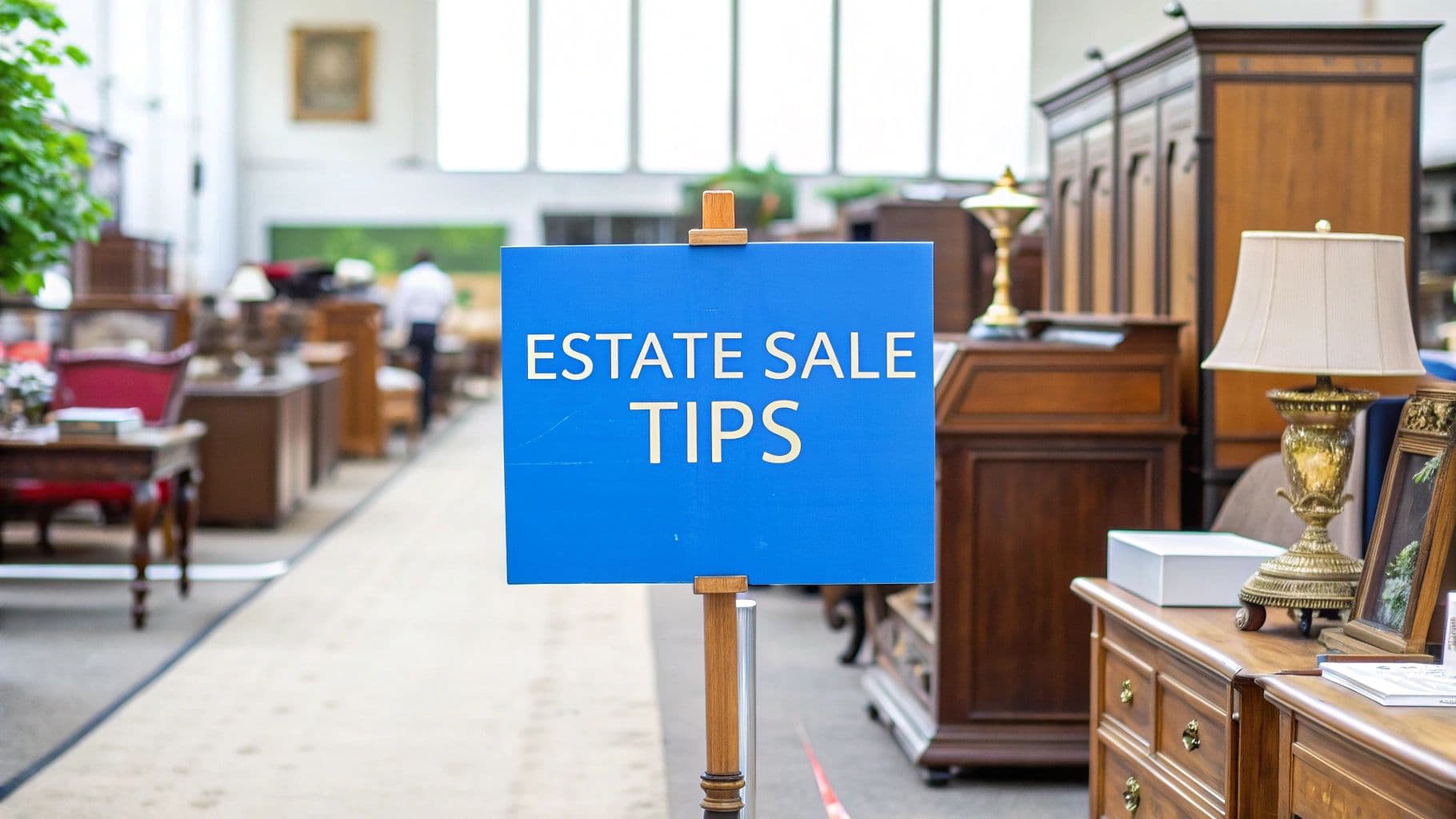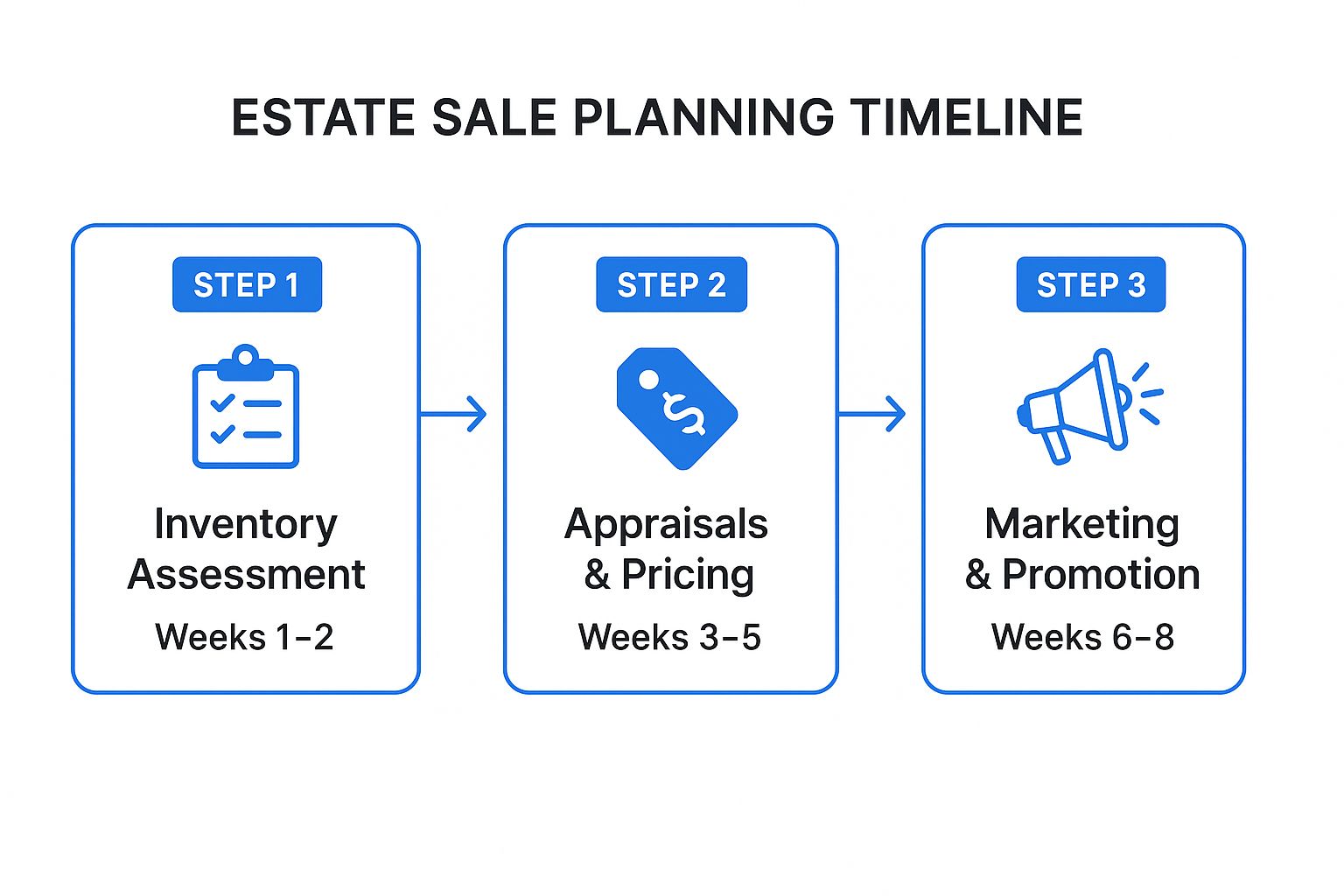7 Essential Estate Sale Tips for Sellers in 2025

Navigating an estate sale can feel overwhelming, whether you're downsizing, managing an inheritance, or relocating. It's more than just selling old items; it's a complex project involving emotional decisions, logistical planning, and financial strategy. A well-executed sale can significantly increase your financial return, while a poorly planned one can lead to stress and lost revenue.
These comprehensive estate sale tips for sellers are designed to provide a clear, actionable roadmap. We'll move beyond generic advice to offer detailed strategies for everything from initial planning and strategic pricing to marketing and day-of-sale management. By following these steps, you can transform a daunting task into a profitable and organized process. You will learn how to:
- Plan and Prepare: Create a realistic timeline and declutter effectively.
- Price and Stage: Research values and present items to attract buyers.
- Market and Execute: Promote your sale across multiple channels and manage day-of logistics.
- Secure and Finalize: Implement safety measures and understand legal obligations.
This guide provides the structure needed to liquidate assets efficiently. It empowers executors, homeowners, and business owners to take control of the process, ensuring you secure the best possible outcome while minimizing unnecessary complications.
1. Start Planning Early - Give Yourself 6-8 Weeks
The most common mistake sellers make is underestimating the sheer volume of work an estate sale requires. Rushing the process inevitably leads to overlooked valuables, inaccurate pricing, and lower overall profits. One of the most critical estate sale tips for sellers is to build a generous timeline. Granting yourself a 6-8 week window transforms the sale from a chaotic scramble into a strategic, profitable event.
This extended period allows you to move beyond simply clearing out a house. It provides the necessary time to methodically sort through every item, conduct thorough research on potentially valuable pieces, and develop a comprehensive marketing plan. Hasty decisions, made under pressure, are almost always costly.
The Value of a Strategic Timeline
A well-structured timeline prevents you from leaving money on the table. For instance, a family in Connecticut increased their estate sale revenue by 40% by taking eight weeks to properly research and price a collection of mid-century modern furniture. Similarly, an estate in California discovered a painting valued at over $15,000 simply because their extended schedule allowed time to research obscure signatures on artwork that might have otherwise been dismissed.
Key Insight: Time is your most valuable asset in estate liquidation. It allows for discovery, proper valuation, and effective marketing, directly impacting your final revenue.
How to Structure Your 6-8 Week Plan
To maximize this planning phase, create a detailed schedule with clear weekly milestones. Here’s how you can break down the process:
- Start with Time-Consuming Areas: Begin sorting in the most cluttered or emotionally charged rooms first, such as attics, basements, or home offices.
- Gather Documentation: Use this time to locate and organize any certificates of authenticity, original receipts, or provenance documents for high-value items like jewelry, art, and antiques.
- Stage for Success: As you sort, take high-quality photographs of key items. These will be essential for creating compelling online listings and promotional materials later.
- Seek Professional Help: This initial period is the ideal time to research and interview professional estate sale companies or appraisers if you decide you need expert assistance.
This 6-8 week timeline can be broken down into three key phases, ensuring a smooth workflow from initial assessment to final promotion.

Following this sequential process ensures that each stage builds upon the last, preventing costly backtracking and ensuring that your marketing efforts are based on a fully priced and organized inventory.
2. Research and Price Items Strategically
Proper pricing is the engine that drives a profitable estate sale. Setting prices too high deters buyers, while setting them too low leaves significant money on the table. The key is to move beyond guesswork and implement a strategic pricing model based on solid research. This involves understanding the fair market value for everything from everyday household goods to unique collectibles.

This methodical approach ensures you capture the true worth of each item. Common goods might be priced at 10-20% of their original retail value, but this rule doesn't apply to antiques, art, or jewelry. Those require a deeper dive to uncover their real value.
The Value of Accurate Valuation
Diligent research can uncover hidden treasures that might otherwise be sold for pennies on the dollar. For example, a seller in Florida almost priced a vintage Rolex found in a drawer at $200, assuming it was costume jewelry. After professional research, it sold for its true market value of $8,000. In another case, a collection of vinyl records, initially bulk-priced, generated over $3,000 after the seller took time to research rare pressings and first editions.
Key Insight: Strategic pricing isn’t about guessing; it’s about data-driven valuation. Every item has a specific market value, and uncovering it is one of the most direct ways to maximize your estate sale profits.
How to Structure Your Pricing Strategy
A multi-layered pricing approach is one of the most effective estate sale tips for sellers. This involves using different research methods for different categories of items. Here’s how you can implement this strategy:
- Check Completed Sales: Use eBay’s “Sold Items” filter to see what similar items have actually sold for, not what sellers are currently asking. This provides a realistic baseline for common goods.
- Consult Professional Databases: For antiques and collectibles, use resources like WorthPoint and LiveAuctioneers. These platforms aggregate data from past auction results, offering a more accurate picture of value.
- Invest in Professional Appraisals: For high-value categories like fine art, jewelry, and rare antiques, hiring a certified appraiser from an organization like the American Society of Appraisers (ASA) is a crucial investment.
- Price Clearly and Flexibly: Use removable stickers to mark each item clearly. Keep a detailed inventory with your pricing logic, which allows for strategic markdowns during the final day of the sale.
This careful approach to valuation and pricing is fundamental to a successful event. To learn more about this crucial step, explore this comprehensive estate sale pricing guide.
3. Organize and Stage Items Attractively
How you present your items is just as important as what you're selling. Shoppers are heavily influenced by visual appeal, and a cluttered, disorganized home can deter buyers and depress prices. One of the most impactful estate sale tips for sellers is to stage the home like a retail store, transforming it from a personal space into an inviting shopping environment.
Effective staging goes beyond simple tidying. It involves strategically arranging furniture, creating thoughtful displays, and ensuring every item is clean and accessible. This approach not only makes shopping easier but also elevates the perceived value of your belongings, directly boosting your final sales figures.
The Value of Professional Presentation
A well-staged sale encourages shoppers to stay longer and spend more. For instance, an estate sale in Texas increased total revenue by 35% by professionally staging furniture into cohesive room settings rather than leaving items in random placements. Similarly, a sale that used proper lighting and velvet displays for jewelry generated 50% higher prices than for comparable items left in disorganized boxes.
Key Insight: Treat your estate sale like a retail pop-up shop. Professional presentation, good lighting, and logical organization can increase overall sales by 25-30% by creating a pleasant and compelling shopping experience.
How to Stage Your Estate Sale for Success
To maximize your revenue, focus on creating an environment that is clean, organized, and easy to navigate. Here’s how you can implement professional staging principles:
- Group Like Items Together: Organize items by category or function. Place all kitchenware in the kitchen, all books in one area, and all tools in the garage. This makes it easy for buyers to find what they are looking for.
- Create Vignettes: Arrange furniture and decor into attractive vignettes that suggest how they could be used in a new home. This helps shoppers visualize the items in their own space.
- Ensure Proper Lighting: Open curtains and use lamps and extension cords to illuminate every corner of the house. Well-lit items look more appealing and allow buyers to inspect them properly.
- Prioritize Cleanliness and Accessibility: Thoroughly clean every item before the sale. Ensure there are clear, wide pathways for shoppers to move around freely without bumping into things. Place your most attractive items near the entrance to draw people in and set a positive tone for the entire sale.
4. Market Effectively Using Multiple Channels
Simply organizing and pricing your items is not enough; a successful sale hinges on attracting a large, motivated crowd of buyers. One of the most impactful estate sale tips for sellers is to implement a robust, multi-channel marketing strategy. Relying on a single platform or a simple yard sign severely limits your reach, leaving significant profits on the table. A comprehensive approach ensures you connect with casual shoppers, dedicated collectors, and everyone in between.
This strategy involves leveraging a mix of specialized estate sale websites, broad social media platforms, and local classifieds to create a powerful promotional engine. Starting this process 2-3 weeks before the sale date builds anticipation and allows word-of-mouth to amplify your efforts. Effective marketing transforms a local event into a must-attend affair, drawing in the serious buyers who are willing to pay for quality.

The Value of a Multi-Channel Approach
A diversified marketing plan directly correlates to higher foot traffic and increased revenue. For example, a seller in Arizona saw a 60% revenue boost by listing their sale on EstateSales.net and specifically targeting collectors by name-dropping brands in the description. Similarly, an estate in Michigan doubled its attendance by posting teaser photos of a vintage car collection on Facebook, generating over 500 shares and creating a viral buzz that a simple sign never could.
Key Insight: Your marketing reach dictates your sales potential. The more channels you use to showcase your best items, the larger and more qualified your pool of buyers will be.
How to Structure Your Marketing Campaign
To maximize your promotional impact, create a plan that targets different types of buyers across various platforms. Here’s how you can execute a powerful marketing strategy:
- Create Compelling Listings: Write detailed descriptions for platforms like EstateSales.net, Craigslist, and Facebook Marketplace. Highlight specific keywords like "antique," "vintage," "mid-century modern," or brand names like "Waterford" or "Pyrex" to attract collectors.
- Leverage High-Quality Photos: Post clear, well-lit photos of your most desirable items. These visuals are your primary tool for generating excitement and proving the quality of your sale.
- Provide Clear Logistics: Your listings and signs must include the full address, sale dates, operating hours, and accepted payment methods (cash, Venmo, credit card).
- Engage with Potential Buyers: Respond promptly to inquiries on social media and listing sites. Answering questions about specific items keeps buyers interested and demonstrates that the sale is well-organized. Learn more about effective estate sale marketing on diyauctions.com.
By systematically deploying these tactics across multiple channels, you build a powerful funnel that directs a steady stream of enthusiastic buyers to your front door on sale day.
5. Implement Security and Safety Measures
An estate sale invites dozens, if not hundreds, of strangers into a private residence filled with valuable items and cash transactions. Overlooking security is a significant risk that can lead to theft, property damage, and personal safety concerns. One of the most important estate sale tips for sellers is to implement a robust security and safety plan to protect your assets and create a secure environment for buyers.
This isn't just about preventing theft; it's about managing crowd control, ensuring financial accuracy, and minimizing liability. A secure sale is a smooth, professional, and profitable sale where everyone feels safe.
The Value of a Secure Environment
Investing in security measures directly protects your bottom line and provides peace of mind. For example, an estate sale in New York prevented an estimated $5,000 in theft by hiring two off-duty police officers and instituting a mandatory bag check at the entrance. In another case, a Florida estate used a numbered tag and central checkout system, which eliminated pricing disputes and ensured every single sold item was accurately logged and paid for.
Key Insight: Proactive security measures are an investment, not an expense. They safeguard your revenue, protect the property, and establish a professional tone that discourages opportunistic theft and disputes.
How to Structure Your Security Plan
A comprehensive security plan addresses potential risks before the doors even open. A multi-layered approach is most effective. Here’s how you can create a secure estate sale environment:
- Control Access and Flow: Clearly mark areas of the house that are off-limits with signs and locked doors. Cordon off any private rooms, dangerous areas like a rickety attic, or sections not included in the sale.
- Manage Valuables and Cash: Keep high-value, small items like jewelry, coins, and watches in a locked display case near the checkout area. Use a central, organized checkout system with a cash box that is emptied regularly. Avoid keeping large sums of cash on-site.
- Establish Clear Rules: Post clear signage at the entrance outlining your rules. This can include "All Bags Subject to Inspection," "You Break It, You Buy It," and "No Large Purses or Backpacks Allowed."
- Consider Professional Help: For high-value estates, hiring professional security or off-duty police officers is a wise investment. Their visible presence is a powerful deterrent. Temporary security cameras in key areas like entrances and checkout stations can also provide valuable oversight.
6. Understand Legal and Tax Implications
Navigating the financial and regulatory aspects of an estate sale is one of the most overlooked yet crucial estate sale tips for sellers. Many sellers focus solely on the physical task of organizing and pricing items, neglecting the significant legal and tax consequences that can arise. Failing to address these obligations can lead to unexpected tax bills, fines, and legal liabilities that can significantly erode your profits.
Understanding these requirements upfront ensures compliance and protects your financial interests. The process involves more than just collecting cash; it requires careful documentation, adherence to local regulations, and a clear grasp of tax law as it applies to the sale of personal and estate assets. This foresight prevents costly mistakes and ensures the sale is both profitable and legally sound.
The Value of Professional Guidance
Proper legal and tax planning can directly translate into substantial savings. For example, an estate in California saved over $15,000 in taxes because the executor worked with an appraiser to properly document the "stepped-up basis" value of inherited assets. Similarly, a family in Texas avoided $5,000 in potential fines by proactively securing the necessary city permits and state sales tax licenses before holding their multi-day event.
Key Insight: Proactive legal and tax planning is not an expense, it's an investment. It shields you from liability and maximizes your net proceeds by minimizing tax burdens and avoiding penalties.
How to Navigate Legal and Tax Requirements
To manage these complexities effectively, you need a clear, step-by-step approach. Here’s how to ensure you remain compliant and optimize your financial outcome:
- Consult Professionals Early: Before you sell a single item, meet with an estate attorney and a tax professional. They can provide guidance specific to your situation, whether you are dealing with an inherited estate or liquidating personal property.
- Secure Necessary Permits: Contact your city or county clerk's office to inquire about required permits for holding a sale. You may also need a sales tax license from your state's revenue department. For a deeper dive into this, you can learn more about estate sale laws and regulations on diyauctions.com.
- Keep Meticulous Records: Document every single sale, no matter how small. Also, keep all receipts for expenses related to the sale, such as advertising, supplies, or professional fees, as these may be deductible.
- Document Asset Basis: For inherited items, work to establish their fair market value at the date of the original owner's death (the stepped-up basis). For personal property you've owned, try to locate original purchase receipts to establish your cost basis. This documentation is vital for calculating capital gains or losses accurately.
7. Negotiate Effectively and Manage Sale Day Operations
The success of your estate sale culminates on the day of the event itself, where effective negotiation and smooth operational management are paramount. A well-managed sale day involves more than just opening the doors; it requires strategic pricing flexibility, efficient crowd control, and a professional checkout process. Mastering these elements can directly increase your total revenue by 20-30% by maximizing sales and creating a positive buying environment.
Proper execution transforms a potentially chaotic event into an organized and profitable one. It ensures that every visitor has a fair chance to browse, negotiations are handled consistently, and transactions are processed quickly and accurately.
The Value of Strategic Operations
A strategic approach to sale day can significantly boost your bottom line. For instance, an estate sale in Ohio increased revenue by 25% by implementing a "bundle discount" strategy, encouraging shoppers to purchase multiple items. Similarly, a Virginia seller successfully managed over 200 visitors on the first day by using a numbered entry system and scheduled viewing times, preventing overcrowding and ensuring a better experience for serious buyers.
Key Insight: Sale day is a performance. Your ability to manage people, prices, and processes in real-time is one of the most crucial estate sale tips for sellers, directly determining the final outcome.
How to Structure Your Sale Day
To ensure a smooth and profitable event, plan your operational strategy in advance. Focus on creating clear systems for pricing, payment, and customer flow.
- Set Negotiation Rules: Start the first few hours with firm prices on high-demand items. As the day or weekend progresses, become more flexible to move remaining inventory.
- Implement a Bundle Strategy: Encourage larger purchases by offering small discounts for customers buying multiple items. For example, "Take 10% off your total purchase of three or more books."
- Establish Clear Staff Roles: If you have helpers, assign specific roles. One person can manage a particular section or room, another can handle the checkout and payment station, while a third can assist with carrying items.
- Offer Multiple Payment Options: Be prepared to accept cash, credit/debit cards (using a service like Square), and popular payment apps like Venmo or Zelle. This convenience prevents lost sales.
- Provide Customer Conveniences: Have a supply of bags, wrapping paper, and boxes available for buyers. This small touch enhances the customer experience and helps them manage their purchases.
7 Key Estate Sale Tips Comparison
| Item | Implementation Complexity 🔄 | Resource Requirements ⚡ | Expected Outcomes 📊 | Ideal Use Cases 💡 | Key Advantages ⭐ |
|---|---|---|---|---|---|
| Start Planning Early - Give Yourself 6-8 Weeks | Moderate: requires thorough scheduling and coordination | Time-intensive upfront; may involve expert consultations | Higher sale prices; better organization; less stress | Estate sales with valuable or numerous items needing prep | Maximizes returns; allows pricing flexibility; reduces rush |
| Research and Price Items Strategically | High: requires detailed market research and appraisal | Significant time and cost for appraisals; research tools needed | Maximized revenue; strategic pricing; buyer confidence | Sales with collectible, antique, or high-value items | Increases accuracy of pricing; supports tax documentation |
| Organize and Stage Items Attractively | Moderate to high: needs design and physical effort | Time and possibly rental/purchase of display materials | Increased perceived value; higher sales; better shopper experience | Sales focusing on aesthetics and impulse purchases | Enhances appeal; encourages purchases; projects professionalism |
| Market Effectively Using Multiple Channels | Moderate: content creation and platform management | Time for content and platform management; possible marketing costs | Greater attendance; higher competition and awareness | Sales targeting broad or diverse buyer demographics | Cost-effective exposure; multi-channel reach |
| Implement Security and Safety Measures | Moderate: requires planning and coordination | Costs for security personnel and systems | Theft and fraud prevention; safer environment | Sales with high-value items or large crowds | Reduces losses; ensures safety; improves crowd control |
| Understand Legal and Tax Implications | High: complex regulatory compliance and documentation | Time and cost for professional legal and tax advice | Legal compliance; tax optimization; audit readiness | Sales involving significant proceeds or complex estates | Prevents penalties; provides legal protection |
| Negotiate Effectively and Manage Sale Day Operations | High: demands strong management and negotiation skills | Staffing, system setup, and real-time operational focus | Increased revenue; smooth operations; positive buyer experience | Large, busy sales needing dynamic pricing and crowd control | Maximizes final revenue; creates professional environment |
Turning Belongings into Profit: Your Next Steps
Successfully orchestrating an estate sale is far more than simply opening your doors and hoping for the best. It's a complex project that blends emotional sensitivity with sharp business acumen. As we've explored, the journey from a house full of possessions to a profitable outcome is paved with deliberate, strategic actions. By following the comprehensive estate sale tips for sellers detailed in this guide, you transform what could be an overwhelming task into a manageable and rewarding process.
The foundation of your success rests on the core principles we’ve covered. Remember that meticulous preparation is your greatest asset. Allocating a generous timeline of six to eight weeks is not a luxury; it's a necessity that allows for thoughtful decision-making, from strategic pricing research to effective marketing campaigns that build anticipation.
Your Path to a Profitable Sale
Let's distill these insights into your final action plan. The most critical takeaways to carry forward are:
- Strategic Staging: Don't just display items; create an inviting shopping experience. Group related objects, create clear pathways, and use good lighting to make every piece look its best. This directly influences buyer perception and their willingness to spend.
- Multi-Channel Marketing: A few signs on the street corner are no longer enough. A robust marketing plan that leverages online platforms like Facebook Marketplace, specialized estate sale websites, and targeted email lists is essential to attract a large, motivated crowd of buyers.
- Informed Pricing: Your pricing strategy is the engine of your sale's profitability. Avoid emotional attachment and guesswork. Instead, use a combination of online research, professional appraisals for high-value items, and a clear discounting plan for the final hours of the sale.
The Real Value of a Well-Run Estate Sale
Mastering these concepts does more than just increase your final earnings; it provides peace of mind. A well-organized sale minimizes stress, reduces post-sale cleanup, and ensures you have honored the value of the items being sold. It’s about achieving a clean slate, whether you're downsizing for retirement, managing a loved one's estate, or moving on to a new chapter in life. The confidence gained from a well-executed plan is invaluable.
The process of liquidating an estate is a significant undertaking, but it is entirely within your control. By embracing a methodical approach, staying organized, and applying these proven estate sale tips for sellers, you are setting the stage for an incredibly successful event. You have the knowledge and the framework to turn personal belongings into substantial profit, closing one chapter with financial success and personal satisfaction.